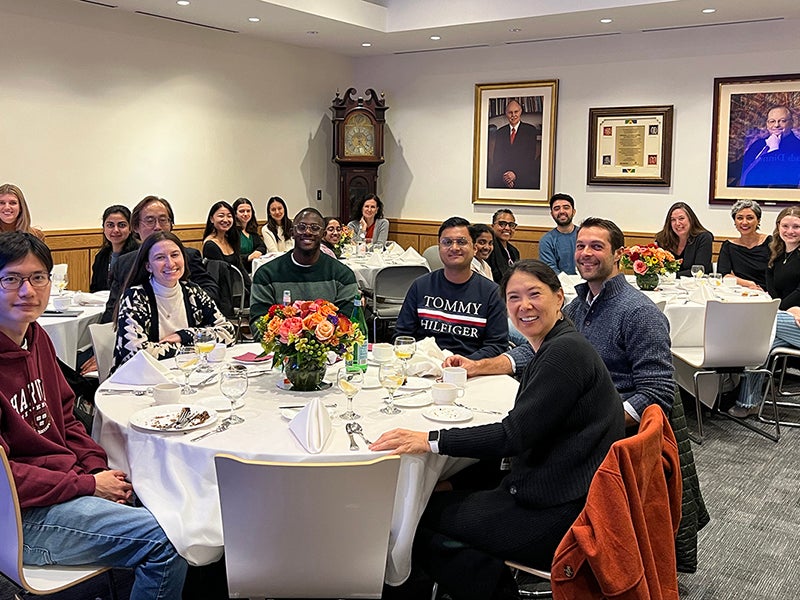 Join small groups of Harvard Chan School alumni and faculty as they share the moments where they found themselves at a crossroads either personally or professionally, and talk about how they navigated those decisions. These events are held on campus and open to all Harvard Chan School students; dinner will be provided.
Join small groups of Harvard Chan School alumni and faculty as they share the moments where they found themselves at a crossroads either personally or professionally, and talk about how they navigated those decisions. These events are held on campus and open to all Harvard Chan School students; dinner will be provided.
Follow the link below to register for one of our upcoming sessions.
Spring 2024 Schedule:
Session 1: March 25, 2024
5:30 pm – 7:30 pm
Kresge 110
March Co-hosts:



About Our Co-hosts
Sara Bleich
Inaugural Vice Provost for Special Projects at Harvard University, Director of the Social Sciences Program and Carol K. Pforzheimer Professor, Harvard Radcliffe Institute, Professor of Public Health Policy, Harvard T.H. Chan School of Public Health, and a faculty member at the Harvard Kennedy School of Government.
Dr. Bleich is a policy expert and researcher who specializes in diet-related diseases, food insecurity, and racial inequality. Prior to this, Dr. Bleich served in the Biden Administration as the Director of Nutrition Security and Health Equity at the U.S. Department of Agriculture’s (USDA) Food and Nutrition Service and as the Senior Advisor for COVID-19 in the Office of the Secretary at USDA. As a White House Fellow during the Obama Administration, she worked at USDA as a Senior Policy Adviser for Food, Nutrition and Consumer Services and on First Lady Michelle Obama’s Let’s Move! initiative. Dr. Bleich was elected to the National Academy of Medicine in 2023.
Kimberlyn Leary
Associate Professor in the Department of Health Policy and Management, Harvard T.H. Chan School of Public Health; Associate Professor of Psychology in the Department of Psychiatry, Harvard Medical School/McLean Hospital, Harvard Medical School; Lecturer in Public Policy, Harvard Kennedy School; Co-faculty Director, Bloomberg Harvard City Leadership Initiative’s Research and Curriculum Program.
Dr. Leary began her career as a clinical psychologist working as a practitioner to improve access to diverse communities. Her early work on negotiated transactions in psychotherapy expanded to broader research on negotiation, conflict transformation, and change management. Dr. Leary served as an adviser to the Obama White House from 2014-2016, working with the White House Council on Women and Girls to develop the Advancing Equity initiative (which focused on improving life outcomes for women and girls of color). Dr. Leary served on the Biden-Harris transition as a member of the Agency Review Team for the Office of National Drug Control Policy and is currently on an Intergovernmental Personnel Act with the Office of Management and Budget serving as a Senior Equity Fellow. She is also a Senior Vice President at the Urban Institute.
Walter Willett
Professor of Epidemiology and Nutrition, Harvard T.H. Chan School of Public Health
Dr. Willett has focused much of his work over the last 40 years on the development and evaluation of methods, using both questionnaire and biochemical approaches, to study the effects of diet on the occurrence of major diseases. He has applied these methods starting in 1980 in the Nurses’ Health Studies I and II and the Health Professionals Follow-up Study. Together, these cohorts that include nearly 300,000 men and women with repeated dietary assessments, are providing the most detailed information on the long-term health consequences of food choices. Dr. Willett has published over 2,000 original research papers and reviews, primarily on lifestyle risk factors for heart disease, cancer, and other conditions and has written the textbook, Nutritional Epidemiology, published by Oxford University Press, now in its third edition. He also has written four books for the general public. Dr. Willett is the most cited nutritionist internationally. He is a member of the National Academy of Medicine of the National Academy of Sciences and the recipient of many national and international awards for his research.
Session 2: April 11, 2024
5:30 pm – 7:30 pm
Kresge 110
April Co-hosts:





About Our Co-hosts
Bryn Austin
Professor of Social and Behavioral Sciences, Harvard T.H. Chan School of Public Health; Professor of Pediatrics, Harvard Medical School; S. Jean Emans, MD, Endowed Chair in Adolescent and Young Adult Medicine, Boston Children’s Hospital; Research Scientist in the Division of Adolescent and Young Adult Medicine, Boston Children’s Hospital.
Dr. Austin is a social epidemiologist and behavioral scientist with a research focus on health inequities, especially those affecting socially and structurally marginalized adolescents, and she has received numerous grants funded by the U.S. National Institutes of Health and other government, foundation, and philanthropic funders to support her research. She leads two primary research programs: One focuses on environmental influences on eating disorders risk and public health approaches to primary and secondary prevention of eating disorders with an emphasis on policy translation research and advocacy. The second focuses on determinants of sexual orientation and gender identity disparities in a range of health domains, including disordered weight-related behaviors, substance use, bullying victimization, and other health risk indicators. A unifying goal of her academic career has been to advance innovations in transdisciplinary science applied to eating disorders prevention and the study of health inequities adversely affecting socially and structurally marginalized youth to inform effective policy change. Across her research and teaching initiatives, her aim is to offer mentorship and opportunities that will help the next generation of talented junior scientists excel in their pursuit of health equity for all.
David Christiani
Elkan Blout Professor of Environmental Genetics, Harvard T.H. Chan School of Public Health; Professor of Medicine at Harvard Medical School.
Dr. Christiani’s major research interest lies in the interaction between human genes and the environment. In the emerging field of molecular epidemiology, he studies the impact of humans’ exposure to pollutants on health, as well as the how genetic and acquired susceptibility to these diseases along with environmental exposures can lead to acute and chronic pulmonary and cardiovascular disease. He is also developing new methods for assessing health effects after exposure to pollutants and is very active in environmental and occupational health studies internationally.
His global work has taken place in Asia, Africa, and North America where Dr. Christiani and his wide network of collaborators are studying of the reproductive effects of exposure to chemicals, in China; arsenic exposure and bladder and skin cancer, in Taiwan and Bangladesh; exposure to indoor combustion products in respiratory disease in Central America; petrochemical exposures, brain tumors, and leukemia in Taiwan; and the molecular epidemiology of esphageal cancer in Africa. Preventing these diseases is an ultimate goal.
He oversees a landmark 40-year-long study of non-smoking related chronic respiratory disease in cotton-textile workers in Shanghai, China. Since 1992, Dr. Christiani has led the NCI-funded Boston Lung Cancer Study which has focused on assessing markers of exposure, susceptibility, and outcomes in lung cancer. He co-led the Lung Program of the Dana-Farber/Harvard Cancer Institute for 20 years. In 2012, President Obama appointed him to a 7 year term on the National Cancer Advisory Board.
Susanna Jacobus
Biostatistician, Dana Farber Cancer Institute; Harvard Chan School Alumna, SM in Epidemiology.
Ms. Jacobus is an experienced Biostatistician with a demonstrated history of working in the hospital & health care industry. She is skilled in Epidemiology, Oncology, Biotechnology, Survival Analysis, and Clinical Research.
Her collaborative work with investigators, locally at DFCI and nationally through the ECOG-ACRIN cooperative group network, centers on clinical research advancing treatment for multiple myeloma (MM) as well as understanding underlying molecular biology and disease risk factors.
JP Onnela
Professor of Biostatistics, Harvard T.H. Chan School of Public Health; Co-Director, Master’s Program in Health Data Science.
Dr. Onnela’s primary interest is in developing quantitative methods in two areas: statistical network science and digital phenotyping. In statistical network science, the study of network representations of physical, biological, and social phenomena, developing quantitative methods for studying social and biological networks and their connection to health. In digital phenotyping, a concept he has introduced as “the moment-by-moment quantification of the individual-level human phenotype in situ using data from personal digital devices, in particular smartphones,” developing quantitative methods for studying social, behavioral, and cognitive phenotypes.
He and his group also co-lead or support several applied studies ranging from central nervous system disorders to women’s health. His group has developed and maintains the open source Beiwe research platform for high-throughput smartphone-based digital phenotyping. He received the NIH Director’s New Innovator Award in 2013 for his digital phenotyping project.
Tim Rebbeck
Vincent L. Gregory, Jr. Professor of Cancer Prevention, Harvard T.H. Chan School of Public Health; Professor of Medical Oncology at the Dana-Farber Cancer Institute; Founding Director, Zhu Family Center for Global Cancer Prevention, Harvard T.H. Chan School of Public Health.
Dr. Rebbeck’s research focuses on the etiology and prevention of cancer, with an emphasis on cancers with a genetic etiology and those that are associated with disparities in incidence or mortality by race. He has directed multiple large molecular epidemiologic studies and international consortia that have been used to identify and characterize genes involved in cancer etiology, understand the relationship of allelic variation with biochemical or physiological traits, explore interactions of inherited and somatic genomic variation with epidemiological risk factors.
He founded and continues to lead international cancer consortia that study risk and outcomes in prostate cancer in men of African descent in North America and Africa.
Session 3: May 1, 2024
5:30 pm – 7:30 pm
Kresge 110
May Co-hosts:




About Our Co-hosts
Francesca Dominci
Clarence James Gamble Professor of Biostatistics, Population, and Data Science, Harvard T.H. Chan School of Public Health; Co-Director of the Harvard Data Science Initiative; Faculty Affiliate in the Department of Environmental Health, Harvard T.H. Chan School of Public Health.
Dr. Dominici is a data scientist whose pioneering scientific contributions have advanced public health research around the globe. Her life’s work has focused broadly on developing and advancing methods for the analysis of large, heterogeneous data sets to identify and understand the health impacts of environmental threats and inform policy.
She is the founder and the lead PI for the National Studies on Air Pollution and Health Group (NSAPH), which is a group of faculty, research scientists, post-doctoral fellows, graduate students, and college students studying data science methodologies in the context of climate change, environmental impacts on health outcomes, and regulatory policy. The group has over 100 members and includes 25 Principal Investigators & Faculty over 12 institutions.
Dr. Dominici is also one of the lead PIs for the BUSPH-HSPH Climate Change and Health Research Coordinating Center, CAFÉ. The CAFÉ is a three-year cooperative agreement with the National Institutes of Health (NIH), a critical component of the NIH Climate Change and Health Initiative to manage and support ongoing climate change and health research and capacity building efforts. Dr. Dominici was elected to the National Academy of Medicine in 2018.
Erica Kenney
Assistant Professor of Public Health Nutrition, Harvard T.H. Chan School of Public Health; Director, PhD Program in Public Health Nutrition; Faculty Affiliate in the Department of Social and Behavioral Sciences.
Trained in social epidemiology and planned behavior change, Dr. Kenney’s research focuses on identifying successful, efficient, and cost-effective strategies to modify children’s environments to make the healthiest choice the easiest choice and to help children form healthy habits for life. Her work is grounded in social ecological theory and the investigation of how children’s environments can be feasibly changed to promote healthy eating habits and less screen time. At the Prevention Research Center, she collaborates with colleagues and community partners to identify and evaluate usable strategies for increasing drinking water access and reducing intake of sugary drinks in school, afterschool, and child care settings. With the Childhood Obesity Intervention Cost Effectiveness Study (CHOICES) team, she also studies the cost-effectiveness of different policy strategies to prevent childhood obesity in early care and education settings. As a faculty member with the Strategic Training Initiative for the Prevention of Eating Disorders (STRIPED), she works with STRIPED trainees to investigate a different dimension of childhood obesity – weight-related discrimination and stigma, and how to ensure that public health efforts to promote healthy eating, physical activity, and healthy weight do not have unintended harmful consequences.
Current projects include a natural experimental evaluation of recent changes to the Child and Adult Care Food Program meal patterns in family child care settings; an implementation science investigation into how policies to promote healthy eating in child care settings nationwide are actually translated; a qualitative investigation of weight discrimination in school settings; and developing measures of exposure to food advertising on mobile devices.
Bernie Lee
Chief, Division of Plastic and Reconstructive Surgery, Beth Israel Deaconess Medical Center; Harvard Chan School Alumnus, MPH.
Dr. Lee is a board certified general surgeon and plastic surgeon. Dr. Lee is also a professor at Harvard Medical School, an active clinical researcher in breast reconstruction, and serves as a principal investigator of various research grants and projects. As a plastic surgeon, his area of expertise is reconstructive microsurgery in patients with cancer and trauma. Dr. Lee’s research has been focused on near infrared imaging (NIR) technologies to identify perfusion characteristics of flaps in reconstructive microsurgery with funding from the National Institutes of Health. Dr. Lee also leads a research team examining outcomes and patient satisfaction after breast cancer and reconstructive surgery. Most recently, the team has been examining patient access, health literacy, and readability of online resources for plastic surgery. His research has also focused on health literacy and patient communication in collaboration with faculty at the Harvard T.H. Chan School of Public Health. Dr. Lee has previously served as President of The Plastic Surgery Foundation and currently serves as President-Elect of the Harvard Chan School Alumni Council and Chair of the Awards Committee within the Harvard Chan School Alumni Association.
Margo Wootan
President, MX Strategies; Harvard Chan School Alumna, PhD in Nutrition.
Dr. Wootan was named one of the Most Innovative Women in Food and Drink by Fortune Magazine and recognized by Harvard School of Public Health for her leadership in public policy. She also has been recognized for her outstanding leadership and dedicated service with awards from Cornell University, the American Public Health Association, Society for Nutrition Education and Behavior, Society for Prevention Research, Directors of Health Promotion and Education, Association of State Public Health Nutritionists, and National Health Information Awards. Dr. Wootan led the successful effort to require trans fat labeling on packaged foods, which significantly contributed to an 80% decline in trans fat consumption in the U.S. She coordinated efforts of the National Alliance for Nutrition and Activity to support passage of the Healthy, Hunger-Free Kids Act, which included improving school meals and removing soda and unhealthy snacks from school vending machines, a la carte lines, school stores, and fundraisers.
Dr. Wootan developed and ran the award-winning 1% Or Less campaign, a community-based nutrition education and promotion program. She led the effort to pass two dozen state and local policies and national legislation to require calorie labeling in fast-food and other chain restaurants. She worked on expanding nutrition and physical activity promotion and funding at the Centers for Disease Control and Prevention and passage of over a dozen state and local healthy restaurant kids’ meal policies. Wootan co-founded and coordinated the activities of the National Alliance for Nutrition and Activity (NANA), a coalition of more than 520 national, state, and local organizations. She also co-founded the Food Marketing Workgroup and has served on numerous expert committees.
Dr. Wootan is quoted regularly in the nation’s major media and appeared in the movies Super Size Me, Fed Up, and Killer at Large. She has testified before Congress and state legislatures and been invited to speak by federal and state agencies including at the U.S. Department of Agriculture, the National Academies of Sciences, Engineering and Medicine, the National Nutrition Summit, and the Surgeon General’s Listening Session for the National Action Plan on Overweight and Obesity.

You must be logged in to post a comment.